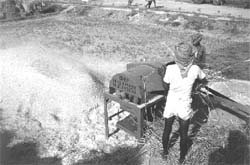Contaminated wheat
 something as common and essential as atta (wheat flour) could be poisoned with pesticides. That's what is said in a new study conducted by the Consumer Education and Research Society, Ahmedabad. The study analysed 10 branded and three loose samples of atta collected from all over the country and found pesticide residue in all the samples. The pesticides that were found include ddt (dichlorodiphenyl trichloroethane) which is known to cause brain and nerve damage in humans, lindane, aldrin/dieldrin and ethion - all of which are highly toxic and suspected carcinogens.
something as common and essential as atta (wheat flour) could be poisoned with pesticides. That's what is said in a new study conducted by the Consumer Education and Research Society, Ahmedabad. The study analysed 10 branded and three loose samples of atta collected from all over the country and found pesticide residue in all the samples. The pesticides that were found include ddt (dichlorodiphenyl trichloroethane) which is known to cause brain and nerve damage in humans, lindane, aldrin/dieldrin and ethion - all of which are highly toxic and suspected carcinogens.
Another study, reported in a chemicals journal, says that tests on wheat samples collected from Punjab, Haryana, Delhi and Mumbai has found residue of ddt and benzene hexachloride (bhc).
An analysis of 20 random atta samples from Mysore by the Central Food Technological Research Institute (cftri), revealed that 30 per cent of samples contained bhc and ddt residues above tolerance limits prescribed by the Food and Agriculture Organisation (fao) and World Health Organisation (who).
When manufacturers of atta were presented the results, most expressed reservations about the authenticity and accuracy of the tests. The brands tested were Kissan Annapurna (Mumbai), A-One, Nice Home(Kochi), Brahmins (Thodupuzha), Manu Bhog (Jodhpur), Morning Stores, Shakti Bhog and Rose (Delhi), Pillsbury (Mumbai), Sindh (Baroda), Super, Sampoorn and Uttam (Ahmedabad).
Related Content
- Gujarat Govt joins other states, says will not permit Field trials of GM food crops in the state
- Bangladesh State of Environment Report: The Monthly Overview, March, 2014
- Inorganic and total arsenic contents in rice-based foods for children with Celiac Disease
- Pakistan State of the Environment Report : The Monthly Overview, September 2013
- Irrational use of pesticides harming ecology, public health: study
- Concentration of selected toxic metals in groundwater and some cereals grown in Shibganj area of Chapai Nawabganj, Rajshahi, Bangladesh
